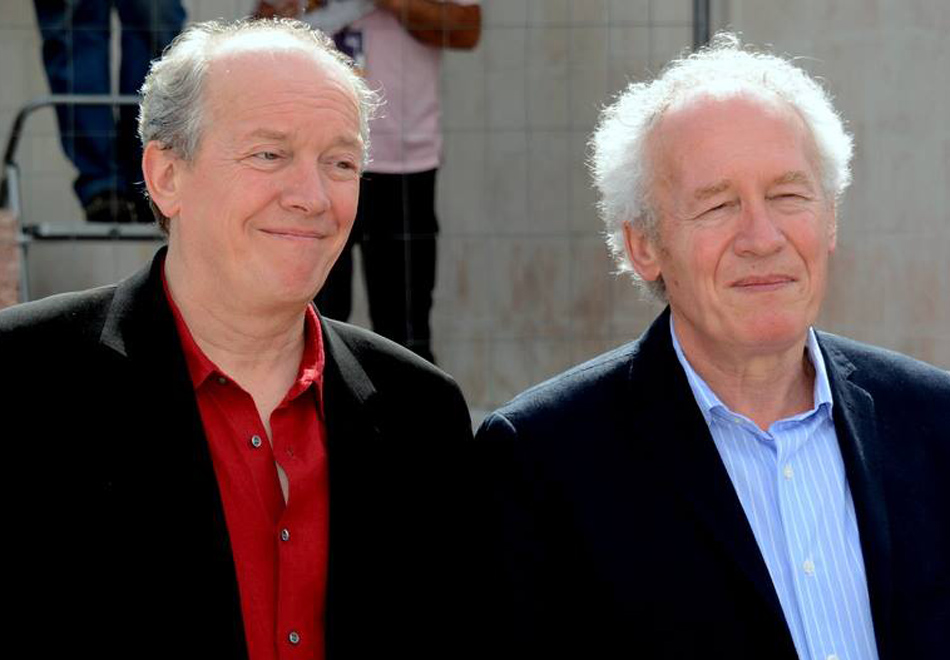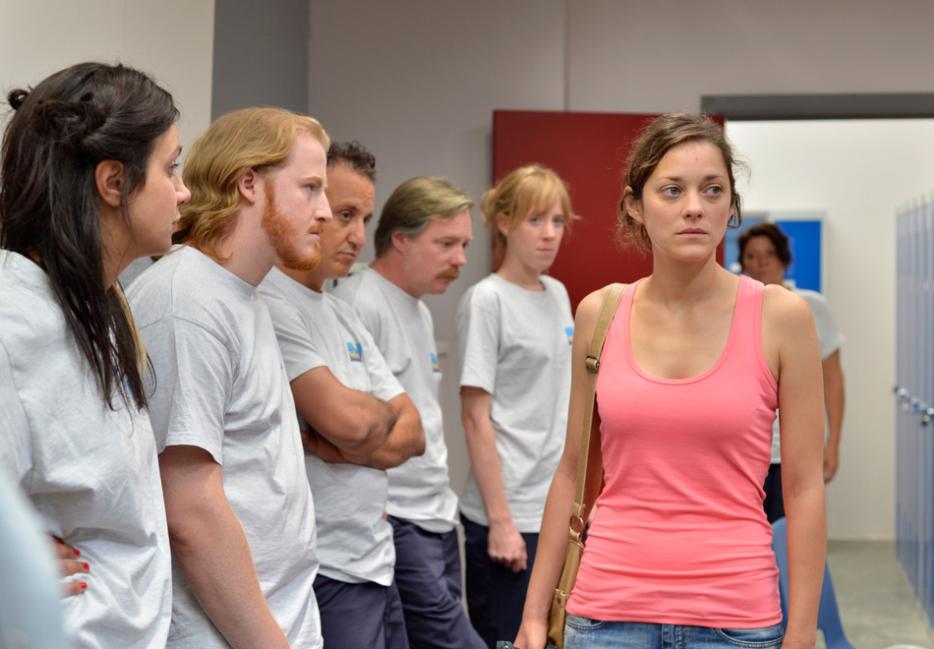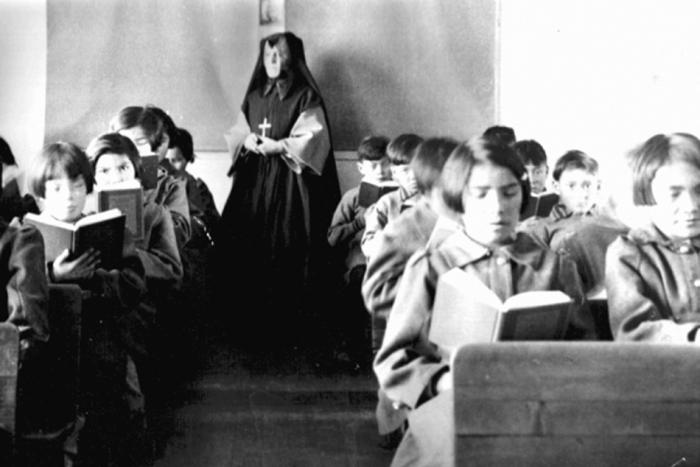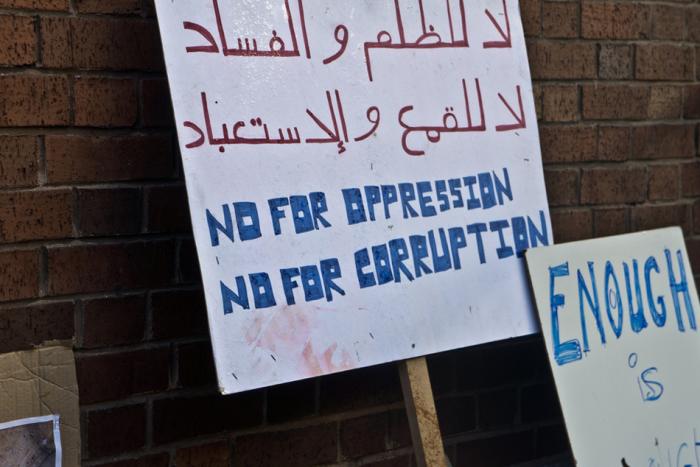Despite the acclaim they have earned (and continue to earn) over the course of their more than 35-year career, Jean-Pierre and Luc Dardenne are too often taken for granted. It’s a problem of consistency: they deliver another masterpiece of ravishing social realism every two or three years with such regularity that at this point critics can hardly feign surprise. Their kinship with the disenfranchised makes their work about the working classes urgent, even necessary, particularly today; it also makes their genius an easy one with which to sympathize. But however familiar their genius has become, it’s still genius: it shines through every film, brilliant and impossible to deny.
The Dardenne brothers returned to Cannes last May with their latest feature, Two Days, One Night, their seventh since 1996. It is, unsurprisingly, an extraordinary work, devastating and deeply felt. The Dardennes brought Two Days, One Night to the Toronto International Film Festival this past September, its final stop on the worldwide festival circuit. I sat down with the loquacious siblings atop a King Street loft to discuss depression, repetition, and why need isn’t always so clear. After some delay—and after Marion Cotillard, the star, earned a surprise Academy Award nomination for Best Actress on Thursday—the film opens theatrically in Toronto this weekend.

Calum Marsh: This is a film about a woman, Sandra, who returns from medical leave and must convince her co-workers to give up a bonus to take her back, but it’s even more specific than that: it’s about a woman who returns from medical leave because of a period of depression. It seems to me that it would be a fundamentally different film were she afflicted by any other illness. Why was depression important for you?
Luc Dardenne: For the depression, there are actually two points that are important for us. First of all, we wanted the depression because we wanted this woman to be absent from her work for a while. Had she been always there, her co-workers wouldn’t have voted to have her laid off. We chose depression as an illness as well because depression is something that you can suffer, maybe, for three months, six months, but eventually you’ll get out of it. We didn’t want an illness where you’re going to fall ill and then not recover, and also because there was a reflection that had come to us from somewhere else, where there was a doctor that said that the cure for depression is not to take Xanax, it’s to have friends, it’s to go out and converse with your friends. We didn’t want to show the story of a woman that has fallen into depression, we wanted to show the story of a woman that is coming out of depression by having to reach out, and to go out, and to talk with her co-workers, and so in that way also help herself to recover.
Of course, medicine and drugs are important to help you move out of depression, but what is important also is to have friends. What happens when you’re depressed is you have a very negative image of yourself, so it’s important to get out of yourself, and to get out and reach out for other people, to relate to other people. We also wanted to show that it was an exclusion, and it wasn’t an exclusion to an equal, and was an exclusion to someone that was weaker, that was more vulnerable, that was in a lower position in regards to the other ones. So when she comes to the job, and the boss is telling her, “well, you’re not good, you’re not performing the way you used to perform, you’re not doing your job,” basically, she can’t say anything because she also finds that yes, she knows she’s not up to the level she used to be, or knows that she can be. So the husband says, “no, but you are strong, you have to show that you are like them. You need to show them that you have that strength in you.” We wanted to show that we’re living in these times where society is excluding the weaker; it’s excluding the marginalized.
Jean-Pierre: As you can see, we don’t tell the story of why she’s depressed, why she’s fallen into depression. Is it something to do with work? Is it something from her family story? Because we’re more interested to show—the movie, really, is about how she gets out of depression, how she will be able to surmount the challenges.
Was it important to you that this illness in particular could not be represented visually, in the same way that, say, a broken leg could be? There also seems to be some ambiguity in this respect regarding the degree to which she has truly recovered. We would know that a broken leg is fixed right away, whereas someone’s recovery from depression is necessarily less clear.
Jean-Pierre: Well, yes—imagine it’s Friday afternoon when the doctor, from a medical perspective, on that specific afternoon, says yeah, you can go back to work again on Monday, you’re fine. But suppose what happens to her on Friday afternoon is what is going to bring her to actually start to fall again, maybe, into depression, because of the facts of what she is facing. So what we wanted to show is the sort of ambiguity there is there, as you were pointing to, because we see her talking to the co-workers, we see her going out there and trying to regain her place, and we see that at times she’s there, she has recovered, but at times she’s not fully there yet. We play with this ambiguity, and it’s actually through this process of having to go back to work that she’s going to regain her place as a human being, and regain her strength as a human being.
Your films routinely deal with parenting. In this case, however, Sandra seems quite distant as a mother, owing largely to her depression. Was there a conscious effort to show her as unavailable to her kids?
Luc: Yes, in the movie, we show this relationship that is a little bit distant with the kids. At the beginning she’s making this cake, or tart, for them; she’s present, she’s on the side of life. But then she knows and hears the news that she hears on Friday afternoon, about the job, and then she’s really removing herself from the relationship with the kids, and becomes more absent. Then it’s the father that is there, and is present, and he says, “what are we gonna do with the kids?” But she’s not fully there, she’s more absent and removed from it, and that’s what we wanted to show.
What was the foundation of the film for you—this character in particular, or the dilemma she faces?
Luc: I think it is the character that we were interested in. It was Sandra. We wanted to see Sandra, but we wanted to see Sandra in this situation, in this story, going through this event. So, for us, it is the character that is then going to illustrate the story.
Jean-Pierre: It’s not like we had a subject, and then we had this character, and so we were going to say, okay, we’re going to put this character into the subject and that’s going to be the story. It was more like, we had the character, and we want the character to convey the story that was happening. We don’t see ourselves like we are above them, and we are treating them like little puppets, that are doing their little show. It’s a more organic construction, where the character is going to play, and be, and become the story itself that we want to tell.
Luc: What we had, in this movie, which was already set for us as a subject, was that we were going to have Sandra, that was going to be the agent, and go out, and talk to all the other people, and we also had the weekend. That’s what we already had, as a subject, as a structure. That’s different from our other movies.
Yes, and in that sense, more than any of your other films, the structure seems to have been imposed upon the material as a necessity of the premise: This is a film in which the hero is tasked with convincing each of her co-workers to give up their bonus in exchange for her job, and the action rarely strays from the fulfillment of that goal. Tell me your approach to structuring the film.
Luc: The idea of the structure was our idea; it just came to us. There was one thing—it was more like a question that came to us—and that was: will it be repetitive? Because it’s gonna be always her, saying the same thing to each one of these co-workers that she needed to go and see in the story. But what we saw, also, is by that, by the fact that it was going to be repetitive, we could also go and see how she is improving. Is she really getting better, or is she really obtaining what she wants to obtain, or not? Through this, we didn’t want to be boring, but we wanted to create some sort of élan, some sort of climax, if you will.
Although the structure was going to be repetitive, or is repetitive, because always she’s going out, and talking to someone, and then coming back home, two elements are very different. One is her reaction when she comes back home. It’s always different. The first time she wants to kill herself, to commit suicide, for example, and another time she has a disagreement with the husband. So that is an element that is bringing difference, that is bringing uncertainty, if you will, and is not going to be repetitive and the same. The other element is that the public, the spectator will be wondering: who is she going to see now, and what is this other co-worker going to say to her? We bet on the side that it was going to be engaging, because of those two elements that will bring difference to it. The third point is that we don’t know is if she is going to win, or if she’s going to lose. You know, you’re counting: okay, she has five votes, and there are nine left, it’s going to happen. You’re keeping track. And so it was a little bit like another movie, Douze hommes en colère.
Wait, sorry, what film is that?
Luc: Er, Douze hommes en colère ... I don’t know the English title.
Douze hommes ... Oh! Twelve Angry Men!
Luc: Yes, this is the one. [Laughs]
I was actually going to ask if that was a deliberate reference. The two films share much in common.
Luc: Well, of course we thought about it, because there are not a lot of movies where there is a voting process like this [Laughs]. So we thought about it, but this other film is more like a closed up space … although, actually, our film is also, in a way, a very closed up space as well.
Were you conscious from the outset of wanting to cover the widest variety of responses to Sandra’s plea?
Jean-Pierre: As far as the screenplay, we knew from the beginning, because this is a story that we’ve been bringing for ten years, we’ve had this story for over ten years. We knew exactly the main structure, and how we wanted it. We wanted her to go and talk to some people; we were not certain about the number because we didn’t want to have too few co-workers but not also too many, because otherwise the repetition would dissolve, and lose itself in momentum, or whatever. So we knew that, and we also knew another thing that was clear for us, and that was we did not want her to have the majority of yes votes before Monday morning. So we knew that as well. As far as the reactions, we were not creating all the other actors that said no, for example, as assholes, if you will—as bad or mean people. We knew that as well.
You wanted to be fair to both sides, in other words.
Jean-Pierre: Well we didn’t want to treat them poorly. We knew that she was going to go out and sometimes convince people to change their vote and say yes after talking to her, and we knew that some would remain stubborn and say no; we knew too that some might change their mind afterward, and that there would be some people she wouldn’t have a chance to talk to at all.
The trajectory that she goes through is also her mental trajectory of her evolution, and how this process of having to talk to the people is a process that’s changing her. So of course before she is completely changed, there will be moments where she is going to fall again. For example, there is a part, where I think it is the fourth person that she goes to talk to, and this person sends her kid to give the answer to Sandra. She is like, “okay, cool, things might be changing.” But the process that you see is a process that she also undergoes herself, within herself.
Luc: So little by little, in this trajectory, she arrives to a place where she also gains a friend, and she’s also able to, in a way, confront her co-worker, and say, “okay, but you have to put yourself in my place, too. Look at my reality.” She’s gaining confidence in herself through this trajectory that she goes through. Sandra is coming to talk with her co-workers, but she’s not coming to judge them, in a way. That’s also what we wanted. The way that we wanted to engage with the spectator and the public is not really to say, “oh, well I’m going to identify myself with the good guy that is helping her—I would help her, of course I would help her,” or, “oh, here is a mean guy that is not—or person or co-worker who is not—going to help her, so I’m really going to distance myself from this other character.” We wanted to engage them, and really look at things in the complexity that they are. Can you really help, or is it not that easy? What is your situation? Is it really that bad that the other person is saying no? It’s really complex; it’s not so easy to make that decision.
One of the most important questions posed by the film is the issue of need—need versus want. Tell me about the significance of this question for you.
Luc: Yes, of course, we wanted to show that. We wanted to show that the reasons for it can sometimes not seem as important as to have more solidarity, and to help someone else. But it was important to see and to show that it’s the middle-class and working-class, and they’re really trying hard to make it happen, to be able to just live, to not fall off the wagon, if you will. But often times, as hard as it can be, I think it is important, even if you are in a difficult position, to really look at your life, and see that often times yes, you can have more solidarity, and you can help, even if it’s really hard for you, and you’re having to have two jobs.
Of course, when we look at the movie, we see that what the boss is doing is a terrible thing. We don’t agree with it. It’s really not what should have happened. But through that, we’re able to show how people that maybe first voted “no, she needs to be laid off, I want to keep my job”—we can show that through the process, they’re also able, when they’re asked, to maybe change their mind, and reflect a little bit more. They’re changing their minds, and they’re able to change themselves, and take a position that is morally more appropriate, morally more correct, and help someone else. That’s what the movie is about: to show people the change.






